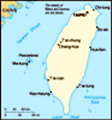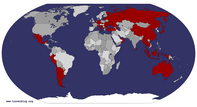Advertisement
Published: March 13th 2013
Roughly halfway between Hualien and Taitung lies the small town of Yuli. The main reason for us to go there is to do some hiking in adjacent Yushan National Park, explore the surrounding area, and spend Chinese New Year's Eve in relative peace and quiet. The southbound local train takes only little more than an hour. We arranged to get picked up from the train station, as our homestay is located a few kilometres outside of Yuli. A friendly bald man in his sixties approaches us, waving and smiling, and we proceed to introduce ourselves. After a few minutes' drive, we arrive at a big country house with a beautiful garden overlooking the Central Mountain Range. The lady of the house comes out to greet us. Inside, we are sat back and offered some tea. It becomes obvious quickly that visitors are treated as honoured guests and not as cash cows here. After checking into our room, which is flooded with light, spacious, and tastefully furnished, they invite us to have lunch with them, even though we only pay for bed and breakfast.
Seeing as our public transport options to get around Yuli are rather limited, we rent a scooter
in town. The lady at the rental office has to give me a quick tutorial, as I've never ridden one of these little beasts before. Lucky everything is fairly self-explanatory. We put on our helmets and zip off into the countryside. First stop is Nanan, a tiny aboriginal hamlet set amidst a stunning scenery of lush, green mountains and fields replete with colourful flowers. We park the scooter and enter the visitor centre to get a map, when all of a sudden, we hear live music. On a paddock just next to the visitor centre, there's some sort of a festival going on, with a band playing on a big stage, a dozen food and clothes stalls and maybe a total of 50 people attending, which includes the band members, organisers and food sellers. Everybody seems to be happy to see us foreigners. We listen to a few songs, including The Cranberries 'Zombie' and a bunch of Chinese karaoke-type ballads, before moving on again.
***
We head Southeast to visit Antong Hot Springs. There appear to be two options if you want to soak your weary body in the thermal waters: posh hotels with
their own spas that non-hotel guests pay to use; free outdoor pools without change rooms or showers. I'd had the idea we'd use the outdoor pools for the true local experience, but J. insists we go to a proper spa. After a brief staredown, I concur. Inside, we pay the fee and get a small water bottle and a serviette-sized towel in return. There are five mixed outdoor pools of different temperatures, as well as separated male and female indoor pools. We decide to check out the indoor pools first, then meet outside.
I put my things into a locker, take a shower (shampoo and shower gel are provided), then slowly step into the 40°C-pool. There are lots of signs in Chinese only that seem to convey a very important message. One particular character, 身, appears to be of utmost importance, as it is bigger and bolder than the other ones. Puzzled, I go out and ask a guy who works there what it means. Seeing that the character looks like a man standing on one leg and spreading the other limbs in a haphazard fashion, I do just that to show him which character I mean. It takes
a while and some deliberations with co-workers, while I keep repeating my movement, for them to understand. "It says you take off your clothes." -"Everything? Even the bathers?" "Yes." I go back into the pool, in the nude this time, and look at that character again. Kind of makes sense, it does look like "Fuck yeah! Let's get naked!! Woohoooo!!!"
Outside, I meet J., who reports her traumatic experience of an old lady refusing her entrance into the pool inside due to her non-nakedness. She decided she'd rather go outside, then. The pools there are a lot more pleasant than inside, anyway. There are a bunch of waterfalls and massage showers, some of which are too brutal to endure. We linger around, switching pools a few times, before briefly hitting the cold pool to finish up.
***
In the morning, we get a fantastic breakfast of different vegetables, tofu, a rubbery type of pancake, mantou buns as well as porridge and warm home-made soy milk. Incredible that the lady would get up so early to cook all those dishes so their guests can eat at 8am.
We plan to hike a section
of the famous Walami Trail on the fringe of Yushan National Park. The park is known for its rich ecosystem and abundant wildlife, while the 14km-trail was built by the Japanese, like so many things in Taiwan. The scenery along the trail is nothing short of breathtaking, with many mysterious mountains soaring spectacularly into a layer of mist. We cross several suspension bridges, pass by gurgling streams, waterfalls and oversized leaves. We hike just the first 4.5km to Jiasan, where we have a great take-away lunch that we bought at Yuli Market in the morning, before looping back to the trail entrance again.
Later that evening, we drop by a bustling night market, where we eat some delicious baozi and drink a really great papaya milk, which Taiwan seems to be famous for.
***
The following morning, we get an equally exquisite breakfast, just this time, we have some company, an Australian couple, who we share an interesting conversation with. After a while, they start bad-mouthing Australia, which is right up my alley.
The day is New Year's Eve, and the most important thing are the preparations for the family dinner, which
we were kindly invited to. To pass the time, we go on another little trip, this time to Luoshan Scenic Area, about 20km south of Yuli. The main attraction there appears to be Luoshan Waterfall, at 120m of a drop one of Taiwan's highest. Unfortunately, the only way to visit it is via a disappointing boardwalk hike, which doesn't even take you close enough to get a proper look at the waterfall. The best view you get is from the parking lot.
The region's specialties are organic rice and volcanic tofu. During the production process of the latter, apparently volcanic chemicals are used as a coagulant. We try a plateful at a little stall next to the parking lot. Can't really taste that much of a difference, honestly. On the drive back down we pass a farmhouse, where we stop for second lunch. This time, we get a delicious volcanic mapo doufu, Szichuan-style (just without the meat), with the really sublimely tasty local organic rice.
Afterwards, we stop by a roadside shop selling locally produced organic goods. We sit down for some really good coffee, brewed inside a percolator, then buy some beetroot and sweet potato chips and
ice cream, before moving on again.
To round up this day's outdoor activities, we drive up all the way to the top of Sixty Stone Mountain. The mountain has been a centre for growing day lilies, or tiger lilies, as they are also known. Taiwanese people actually eat them fresh or use them dried in teas. Too bad we're not here for harvest time, when the whole mountain is covered in pretty orange blossoms. Still, we get a great view, and the cloudy weather and light rain just adds a nice, sombre atmosphere to it all. We're pretty much the only people around anyway. Not many tourists seem to make it to these far-flung destinations, which are impossible to get to by public transport. Plus, the locals must already be busy cleaning and preparing everything for Chinese New Year.
***
At night, it's time for the big New Year's Eve dinner. We eat together with our hosts, their son and daughter, as well as another Taiwanese family, complete with son and daughter, who are guests in the homestay as well. The food turns out to be a little disappointing, but mainly due to
the fact that our breakfasts there have been so overwhelmingly good so far. There are a few vegetable dishes, tofu, rice and a some dishes. I am coerced into drinking a gaoliang with the men. It's a very traditional Taiwanese sorghum liquor, and it does pack a punch, to say the least. I drink mine in several sips with long breaks in between, a source of infinite enjoyment for everybody else. "Is he gonna finish it this time? Aaaah, no, just another small sip again.", I imagine is what they say. I make the mistake of saying 'gan bei', which I thought was the same as 'cheers' or 'Prost', but it actually literally means 'bottoms up', or so I'm told.
After dinner, we move on to the lounge room to drink tea and eat snacks. We linger around for quite a few cups of tea, but when my eyelids become heavier and heavier, I realise it's time to call it a night. We express our heartfelt gratitude to the kindness that was extended to us and all the good food we were served. It feels like a big thing to be invited to a family dinner on New Year's
Eve, and we are glad we got to experience it.
Advertisement
Tot: 0.275s; Tpl: 0.014s; cc: 38; qc: 144; dbt: 0.1746s; 1; m:domysql w:travelblog (10.17.0.13); sld: 1;
; mem: 1.6mb


























